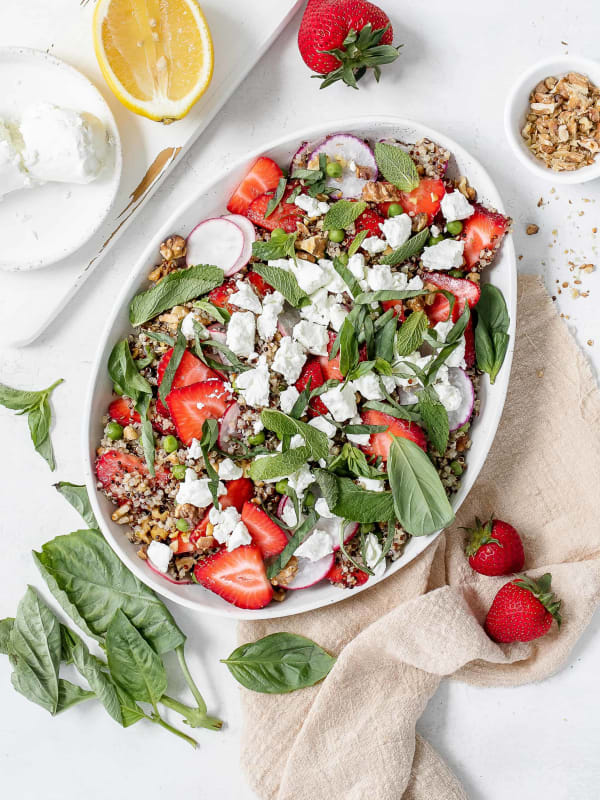Popular Conditions & Diets

Handful for handful, berries are some of the most potent, health-promoting foods on this planet. Low on the glycemic index and chock full of complex antioxidants, they are true superfoods exemplified. From boosting immune function, helping regulate hormones, and making skin silkier to protecting the heart and stopping aging, berries have a stunning host of nutritional benefits. And though it's easy to confidently say that eating various berries is an excellent idea for pretty much everybody, they are not all the same. Let's zoom in on seven of our favourite berries (four of which actually aren't berries at all) and check out the unique and astonishing health benefits they each have to offer.
Check out 27 Delightful Recipes from Rily Featuring Seasonal Berries

Cherries are believed to have originated in present-day Turkey and Iran thousands of years ago before spreading across Europe and Asia. And when they're in season, life is good. These blushing red beauties are loaded with bioactive compounds like polyphenols, carotenoids, potassium, fibre, and vitamin C. But what sets them apart from other berries is a generous offer of tryptophan, serotonin, and melatonin (especially high in tart cherries). It's, therefore, no surprise that research has shown that they can improve sleep quality. Human studies on cherries have repeatedly found that they reduce oxidative stress markers, inflammation, exercise-induced muscle soreness, blood pressure, and arthritis pain. They also minimize hemoglobin A1C, a critical marker of blood sugar balance. As if all that weren't enough, cherries consistently improve the triglyceride-HDL ratio- one of the single most important indicators of cardiovascular health.

It may surprise you to learn that strawberries aren't technically berries at all. Botanically, they are described as pseudocarps or "false fruits;" when you look at a single strawberry, you look at hundreds of miniature fruits combined into one frame, each fruit surrounding its seed. Technicalities aside, strawberries are phenomenal allies to good health. Epidemiological studies show that the more strawberries a person eats, the less likely they are to experience high blood pressure or elevated C-reactive protein, the go-to marker for systemic inflammation. They also powerfully inhibit the oxidative stress following high-fat meal consumption, mitigate blood sugar spikes, and balance cholesterol panels in people at risk of heart disease. Eating strawberries daily for just four weeks can significantly improve insulin resistance. Individual chemical compounds in strawberries have also demonstrated significant anti-cancer abilities, blocking the progression and proliferation of tumours. They may be false fruits, but the benefits are very real!

In ancient days, blackberry juice was used to make dye, and some medieval manuscripts were even coloured with their ink. The plush, dark blackberry hue reveals an extreme endowment of anthocyanins - potent antioxidant compounds that fight inflammation and various diseases. These and other phenolic compounds in blackberries protect against age-related neurodegeneration, bone loss, and oxidation of fatty structures in the body, like cell membranes and cholesterol transporter proteins. Blackberry extracts have also demonstrated antimutagenic effects, suppressing the growth and spread of tumours. Even the whole fruit has proven its ability to fight against colon, oral, and esophageal cancers. High in vitamins C and K, fibre, and manganese, these 'false fruits' (yes, also blackberries) can regulate digestion and support healthy immune function.

Amidst the diet wars and endless nutrition debates online, berries are almost amazingly non-controversial: whether you're plant-based, keto, paleo, low fodmap, or anything else, you'd do well to enjoy berries as a delicious and profoundly nutritious part of your day. In a world where even orange juice is criticized for spiking blood sugar levels, berries have escaped all negativity and receive only praise on all sides. They are undoubtedly, indubitably, unquestionably good for your heart, skin, immune system, gut, mind, and more. Best of all, they have rightfully earned their reputation as nature's candy - delicious! Eating berries in season is one of the great joys of summer, and knowing just how stupefyingly healthy they are makes them all the sweeter.
Aiyer, H. S., Vadhanam, M. V., Stoyanova, R., Caprio, G. D., Clapper, M. L., & Gupta, R. C. (2008). Dietary berries and ellagic acid prevent oxidative DNA damage and modulate expression of DNA repair genes. International journal of molecular sciences, 9(3), 327–341. https://doi.org/10.3390/ijms9030327
Basu, A., Izuora, K., Betts, N. M., Kinney, J. W., Salazar, A. M., Ebersole, J. L., & Scofield, R. H. (2021). Dietary Strawberries Improve Cardiometabolic Risks in Adults with Obesity and Elevated Serum LDL Cholesterol in a Randomized Controlled Crossover Trial. Nutrients, 13(5), 1421. https://doi.org/10.3390/nu13051421

Native to North America going back a staggering 13,000 years, blueberries deserve all the acclaim they get and then some. It's hard to summarize just how incredible blueberries are for human health. They are high in fibre, vitamin C, vitamin K, and manganese and low enough in natural sugars to play a treasured role in ketogenic diets. But beyond these features, blueberries are blessed with a unique compound called pterostilbene, a true chemical rockstar. This 'epinutrient' can activate human DNA segments to send its healing messengers throughout the body. Blueberries are so good for us not because of what they provide us through nutrients but because of our physiological response to blueberry chemicals hitting the scene. This domino effect multiplies the power of blueberries many times over! For this reason, eating these berries can drop systemic inflammation, strengthen the gut's mucosal barrier, crush free radical damage, stop cancerous cells from spreading, and boost BDNF - the brain's "Miracle-Gro" molecule.
Check out our ingredient [Blueberries: nature's blue diamonds](feature https://www.rily.co/articles/blueberries:-nature's-blue-diamonds-8)
Mulberries, often overlooked amidst the pantheon of other common supermarket berries, have a rich history of cultivation going back thousands of years. Herbalists are well aware that different parts of plants, like fruits, leaves, twigs, and bark, have medicinal and cosmetic value. The mulberry fruits are excellent sources of vitamins C and K, iron, potassium, and fibre. They also contain resveratrol, a potent antioxidant for graceful longevity. White, red, and black mulberries each impart their nuances in flavour, but all demonstrate terrific antimicrobial, anti-diabetic, anti-inflammatory, and anti-cancer effects. Like most berries, they are also rich in antioxidants and can help to balance and protect blood cholesterol. Eating mulberries can even protect the liver (hepatoprotective) and the brain (neuroprotective). And just like strawberries, mulberries aren't technically berries either- their cluster shape gives them away as another pseudocarp.
If you guessed by now that the little red clusters we call raspberries are false fruits like mulberries, strawberries, and blackberries, you would be 100 percent right! It's funny to think that many people's favourite berry isn't a berry at all. Nevertheless, raspberries are exploding with health benefits due to excellent bioactive chemicals like quercetin, a robust 'Swiss army knife' of sorts with anticarcinogen, antiviral, antimicrobial, antioxidant, anti-inflammatory and immune-boosting properties. These pseudocarps are also absolutely loaded with fibre- possibly more than any other berry and more than most fruits. This makes them perfect for supporting healthy bowel function and feeding a happy gut microbiome. But the crown jewel of raspberries is most likely ellagic acid, another multifaceted wonder molecule that promotes healthy estrogen metabolism, inhibits at least six different types of cancer, and stops oxidative damage to DNA in its tracks. Interestingly, eating red raspberries is more effective for boosting health than supplementing individual compounds found in them, suggesting a natural synergy found only in the whole fruit.
All berries are rich in antioxidants, but believe it or not, cranberries occupy the top of the pyramid. One study compared 20 different fruit juices and found cranberries to have the highest free radical-squashing power of them all! This has tremendous implications for protecting the heart, the brain, and the gut while offering significant anti-aging effects on the skin and the whole body. Regarding nutrients, cranberries are rich in vitamins C, E, and K1, manganese, and fibre. Their excellent vitamin C content and easy storage made them a miraculous tool for preventing scurvy among sailors in the 18th century. But despite all these unique assets, the health benefit most commonly associated with cranberries is urinary health- and this reputation is well-earned. Compounds in cranberries (most notably a sugar called d-mannose) effectively fight UTIs by stopping infectious bacteria from adhering to our bladder, kidneys, and urethra. Less well-known is that the same fantastic molecules massively benefit our oral health, preventing tooth decay and cavity formation!
Read our feature 7 reasons to add cranberries to your diet
Basu, A., Nguyen, A., Betts, N., & Lyons, T. J. (n.d.). (PDF) strawberry as a functional food: An evidence-based review. ResearchGate. https://www.researchgate.net/publication/259351100_Strawberry_As_a_Functional_Food_An_Evidence-Based_Review
Bjarnadottir, A. (2019, February 22). Mulberries 101: Nutrition Facts and health benefits. Healthline. https://www.healthline.com/nutrition/foods/mulberries#nutrition
Blackberry. alimentarium. (n.d.). https://www.alimentarium.org/en/fact-sheet/blackberry
Burton-Freeman, B. M., Sandhu, A. K., & Edirisinghe, I. (2016). Red Raspberries and Their Bioactive Polyphenols: Cardiometabolic and Neuronal Health Links. Advances in nutrition (Bethesda, Md.), 7(1), 44–65. https://doi.org/10.3945/an.115.009639
Eubanks, A., & Parrucci, L. (n.d.). The Strawberry: A Multiple Fruit. The strawberry: A multiple fruit. https://carnegiemuseums.org/magazine-archive/1997/mayjun/dept4.htm#:~:text=Surprisingly%2C%20eggplants%2C%20tomatoes%20and%20avocados,embedded%20in%20a%20fleshy%20receptacle
Hannum S. M. (2004). Potential impact of strawberries on human health: a review of the science. Critical reviews in food science and nutrition, 44(1), 1–17. https://doi.org/10.1080/10408690490263756
Jan, B., Parveen, R., Zahiruddin, S., Khan, M. U., Mohapatra, S., & Ahmad, S. (2021). Nutritional constituents of mulberry and their potential applications in food and pharmaceuticals: A review. Saudi journal of biological sciences, 28(7), 3909–3921. https://doi.org/10.1016/j.sjbs.2021.03.056
Kaume, L., Howard, L. R., & Devareddy, L. (2012). The blackberry fruit: a review on its composition and chemistry, metabolism and bioavailability, and health benefits. Journal of agricultural and food chemistry, 60(23), 5716–5727. https://doi.org/10.1021/jf203318p
Kelley, D. S., Adkins, Y., & Laugero, K. D. (2018). A Review of the Health Benefits of Cherries. Nutrients, 10(3), 368. https://doi.org/10.3390/nu10030368
Link, R. (2022, November 12). The fruit that protects your heart & liver. Dr. Axe. https://draxe.com/nutrition/mulberry/
Martins, M. S., Gonçalves, A. C., Alves, G., & Silva, L. R. (2023). Blackberries and Mulberries: Berries with Significant Health-Promoting Properties. International journal of molecular sciences, 24(15), 12024. https://doi.org/10.3390/ijms241512024
Oregon State University. (2022, December 19). Red raspberries. College of Agricultural Sciences. https://foodsci.oregonstate.edu/berryhealth/fact-sheets/red-raspberries#:~:text=Among%20several%20significant%20phytochemicals%2C%20red,of%20carcinogens%20in%20several%20tissues
Sun, J., Chu, Y. F., Wu, X., & Liu, R. H. (2002). Antioxidant and antiproliferative activities of common fruits. Journal of agricultural and food chemistry, 50(25), 7449–7454. https://doi.org/10.1021/jf0207530
U.S. Highbush Blueberry Council. (2021, August 4). History of blueberries. Blueberry.org. https://blueberry.org/about-blueberries/history-of-blueberries/#:~:text=Our%20favorite%20boost%20of%20blue,in%20North%20America%20each%20year